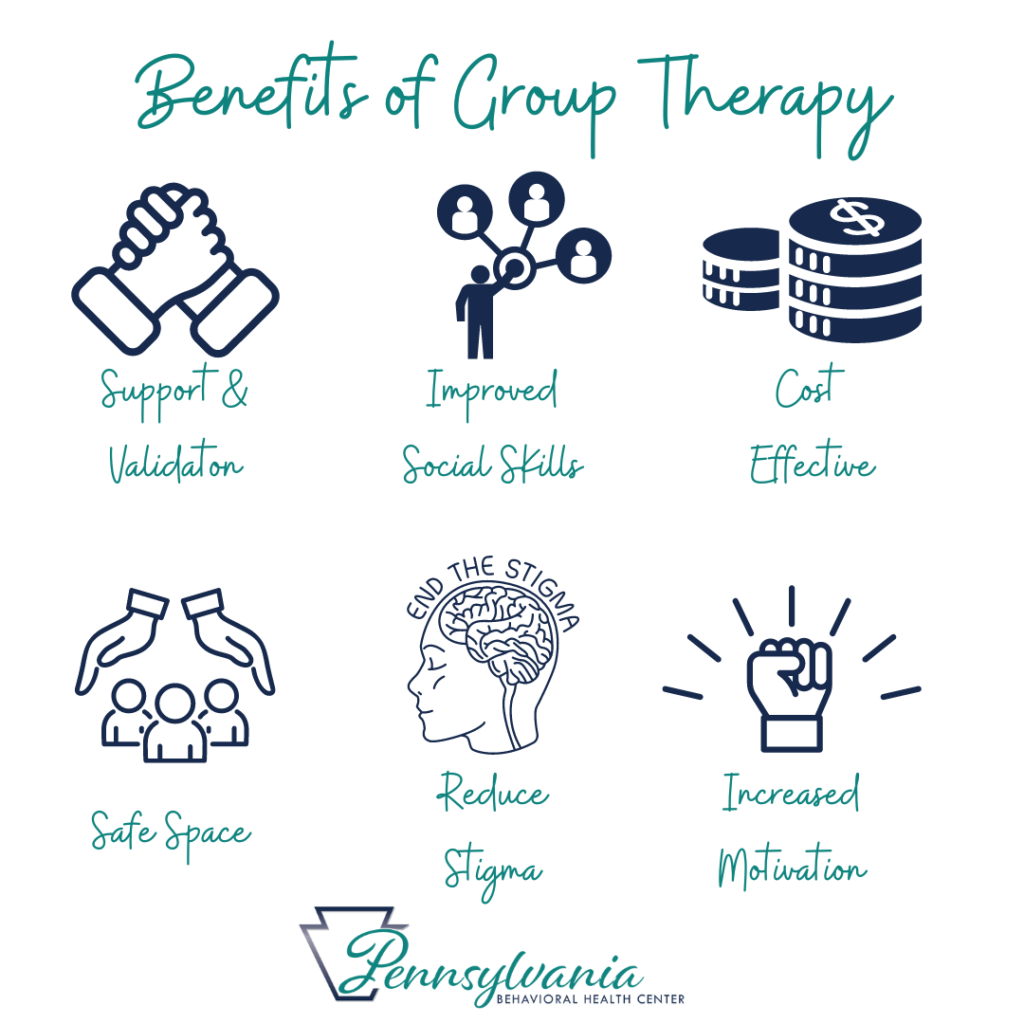Group Therapy For Mental Health In Pennsylvania

Opportunities don't happen YOU create them
Group Therapy For Mental Health
Group therapy for mental health is a popular and effective form of therapy in Pennsylvania. According to research, group therapy is an evidence-based practice that helps individuals to improve their mental health and well-being. In this overview, we will discuss the benefits of group therapy, who would benefit from it, and how to find group therapy in Pennsylvania.
Research On Group Therapy
Research has shown that individuals who participate in group therapy for depression are more likely to experience a significant reduction in symptoms compared to those who receive individual therapy alone. In fact, one study found that 73% of participants in group therapy experienced a decrease in symptoms, while only 46% of those who received individual therapy reported the same improvement. This statistic suggests that group therapy can be a powerful tool for individuals seeking to improve their mental health and well-being.
Percentage of participants in group therapy who experienced a decrease in symptoms.
Benefits of Group Therapy
Group therapy offers a unique and supportive environment where individuals can share their experiences, emotions, and challenges with others who are going through similar experiences. It provides a safe space to express thoughts and feelings without judgment and gain insights from others who may have different perspectives.
Research has shown that group therapy can be particularly effective for people with depression, anxiety, addiction, eating disorders, and trauma-related issues. Group therapy can help individuals build social skills, reduce feelings of isolation, and develop a sense of community.
What Does Group Therapy Cost & Does Insurance Cover it?
Group therapy is also cost-effective compared to individual therapy, as the cost of therapy is shared among the group members. Furthermore, group therapy is often more accessible, as it may have shorter wait times and more flexible scheduling options. Most mental health treatment providers accept insurance for group therapy. You may be responsible for a copay or a deductible. Some insurances that cover group therapy are:
- Blue Cross Blue Shield Independence
- Aetna
- Cigna
- UnitedHealthcare Optum
- Beacon
- UPMC
- Geisinger
If you need help finding a provider don’t hesitate to reach out to Pennsylvania Behavioral Health Center at 610-563-2752.
Statistics on Group Therapy as an Evidenced-Based Practice
Research has shown that group therapy is an effective form of treatment for various mental health conditions. According to a study published in the Journal of the American Medical Association, group therapy was found to be as effective as individual therapy in treating depression, anxiety, and substance abuse. Another study published in the Journal of Consulting and Clinical Psychology found that group therapy was effective in reducing symptoms of post-traumatic stress disorder (PTSD) among veterans.
What are the different types of Group Therapy?
There are many different types of group therapy sessions that a licensed clinician might run, depending on the needs of the group members and the goals of the therapy. Here are some examples:
Cognitive Behavioral Therapy (CBT) Group: In a CBT group, members work together to identify and challenge negative thought patterns that contribute to their mental health issues. The group might involve group discussions, role-playing exercises, and homework assignments to practice new skills.
Dialectical Behavioral Therapy (DBT) Group: A DBT group typically focuses on teaching skills for emotion regulation, distress tolerance, mindfulness, and interpersonal effectiveness. Group members might practice these skills through role-playing exercises, group discussions, and homework assignments.
Support Group: A support group provides a safe and supportive environment for individuals to share their experiences and emotions with others who are going through similar challenges. The group might involve guided discussions, sharing exercises, and opportunities for group members to offer support and advice to each other.
Psychoeducational Group: In a psychoeducational group, members learn about a specific topic related to mental health, such as coping strategies for anxiety or communication skills for healthy relationships. The group might involve presentations, group discussions, and experiential exercises to practice new skills.
Art Therapy Group: An art therapy group allows individuals to express themselves creatively through various art forms, such as drawing, painting, or sculpting. The group might involve guided exercises, sharing of artwork, and group discussions about the emotions and themes expressed in the art.
What do you do in a Group Therapy session?
Group therapy sessions typically involve a group of individuals who meet regularly with a licensed clinician to address mental health issues and improve their overall well-being. The sessions are designed to provide a supportive and non-judgmental environment where individuals can share their experiences and emotions with others who are going through similar challenges.
Here’s what typically goes on in a group therapy session:
Check-in and Introductions: At the beginning of the session, the group members typically check-in with each other and introduce themselves. This helps to create a sense of community and establish a supportive environment.
Topic Discussion: The group may have a specific topic or theme for the session, such as coping with anxiety or building healthy relationships. The clinician may lead a discussion on the topic and invite group members to share their experiences and insights.
Group Activities: Depending on the type of group therapy, there may be group activities or exercises that the group participates in, such as role-playing exercises, art therapy, or mindfulness exercises.
Sharing and Feedback: Throughout the session, individuals are encouraged to share their thoughts, feelings, and experiences with the group. The clinician may provide feedback and guidance to help individuals process their emotions and thoughts.
Closure: At the end of the session, the group may have a brief check-out and discuss any insights or takeaways from the session. The clinician may provide homework or assignments to help individuals practice new skills or continue their progress outside of the group.
Overall, group therapy sessions provide individuals with a supportive environment to explore their emotions and challenges, develop new skills, and build social connections with others who are going through similar experiences. By sharing their experiences with others, individuals can gain new perspectives, learn from others’ experiences, and feel more supported in their journey towards better mental health.

To find group therapy in Pennsylvania, you can search online for mental health providers or group therapy programs in your area. You can also ask for referrals from your primary care physician, insurance provider, or other mental health professionals. Call PABHC at 610-563-2752 for help.
Group therapy can be used to address a wide range of mental health issues, including anxiety, depression, PTSD, addiction, eating disorders, and relationship difficulties.
The number of individuals in a group therapy session can vary, but groups typically range from 5-12 members. Larger groups may be less intimate, while smaller groups may provide more opportunity for individual attention and support.
Group therapy sessions typically meet once a week for an hour or two. The length and frequency of sessions may vary depending on the needs of the group.
Yes, group therapy sessions are typically confidential, and group members are expected to respect each other’s privacy and confidentiality. However, there are limits to confidentiality in cases where individuals may be a danger to themselves or others, or if there is suspicion of abuse or neglect.
Yes, participating in group therapy can be a helpful complement to individual therapy, and may provide a different perspective on mental health challenges. It’s important to discuss your options with your individual therapist and determine what approach is best for your needs.
Your first group therapy session may involve introductions and getting to know the other members of the group. The clinician may also discuss the goals and structure of the group and invite group members to share their thoughts and expectations for the group. It’s important to approach the session with an open mind and be willing to share your experiences and emotions with the group.
Lady GaGa on Group Therapy
Lady Gaga: The pop star has been vocal about her struggles with depression, anxiety, and PTSD, and has credited group therapy with helping her cope. She once said:
“Group therapy is my favorite thing. It’s such a safe place to be vulnerable, and it’s comforting to know that you’re not alone.”
Do I need Group Therapy?
Deciding whether or not you need group therapy for mental health can be a personal decision and may depend on various factors. Here are some signs that group therapy might be a helpful option for you:
You feel isolated or alone in your struggles with mental health challenges: Group therapy can provide a supportive environment where you can connect with others who are going through similar experiences. Being part of a group can help you feel less isolated and more understood.
You feel like you would benefit from the support of others: Group therapy can provide a supportive network of individuals who can offer empathy, encouragement, and accountability as you work towards better mental health.
You want to learn new skills for coping with mental health challenges: Group therapy can offer a structured and educational approach to learning new coping skills, such as mindfulness techniques or cognitive-behavioral strategies.
You have tried individual therapy in the past and want to explore a different approach: Group therapy can offer a different perspective on mental health challenges and may be a helpful complement or alternative to individual therapy.
You are struggling with specific issues or concerns, such as addiction, trauma, or relationship difficulties: Group therapy can provide a focused and targeted approach to addressing specific mental health challenges and may be particularly helpful in addressing issues that affect interpersonal relationships.
Ultimately, the decision to seek group therapy for mental health is a personal one, and it’s important to discuss your options with a licensed mental health professional who can help you determine the best course of action for your individual needs.
- American Psychological Association. (2021). Group Therapy. https://www.apa.org/topics/group-therapy
National Institute of Mental Health. (2016). Psychotherapies. https://www.nimh.nih.gov/health/topics/psychotherapies/index.shtml
Substance Abuse and Mental Health Services Administration. (2015). Group Therapy.
Psychology Today. (n.d.). Group Therapy. https://www.psychologytoday.com/us/therapy-types/group-therapy
American Psychiatric Association. (2021). What is Group Therapy? https://www.psychiatry.org/patients-families/group-therapy
Healthline. (2021). Group Therapy.
Mayo Clinic. (2021). Group Therapy.
National Alliance on Mental Illness. (2021). Group Therapy.
Pennsylvania Psychological Association. (2021). Find a Psychologist. https://www.papsy.org/page/FindaPsychologist
Psychology Today. (2021). Find a Group Therapist. https://www.psychologytoday.com/us/therapists/group/pennsylvania
National Institute of Mental Health. (2021). Mental Health Information. https://www.nimh.nih.gov/health/index.shtml
Substance Abuse and Mental Health Services Administration. (2021). Behavioral Health Treatment Services Locator. https://findtreatment.samhsa.gov/

